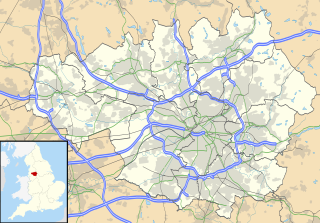This article has multiple issues. Please help improve it or discuss these issues on the talk page . (Learn how and when to remove these template messages)
|
The Salvation Army first came to Manchester in 1878.

Manchester is a city and metropolitan borough in Greater Manchester, England, with a population of 545,500 as of 2017. It lies within the United Kingdom's third-most populous metropolitan area, with a population of 3.2 million. It is fringed by the Cheshire Plain to the south, the Pennines to the north and east, and an arc of towns with which it forms a continuous conurbation. The local authority is Manchester City Council.
Over the years there have been corps (Salvation Army term for local churches) in the following locations:

A church building or church house, often simply called a church, is a building used for Christian religious activities, particularly for Christian worship services. The term is often used by Christians to refer to the physical buildings where they worship, but it is sometimes used to refer to buildings of other religions. In traditional Christian architecture, the church is often arranged in the shape of a Christian cross. When viewed from plan view the longest part of a cross is represented by the aisle and the junction of the cross is located at the altar area.
- Manchester I (Manchester Temple), Grosvenor Street, Chorlton-on-Medlock, 1879 to current. A modern Salvation Army building stands on the site now, and is called Manchester Central.
- Manchester II (Star Hall), Pollard Street, Ancoats, 1878. The corps met from 1879 to 1920 in the Round Chapel, in Every Street.
- Manchester III (Openshaw Citadel) (also known as the Poor Man's Palace), Dyer Street, 1879.
- Manchester IV (Miles Platting), Cash Street, 1880
- Manchester V (Bradford Road), Marcar Street, 1882 to 1924.
- Manchester VI (Newton Heath), Thorp Road, 1883
- Manchester VII (Gorton), Knutsford Road, 1883
- Manchester VIII (Harpurhey), Orpington Close, 1883 to 2006.
- Manchester IX (Hightown), Marlborough Street, 1885
- Manchester X (Hulme), Russell Street, 1885
- Manchester XI (Moss Side), Darnecombe Street, 1885
- Manchester XII (Longsight), South Street, 1886
- Manchester XIII (Greenheys), Chapel Street, 1886
- Manchester XIV (Collyhurst), Monsall Street, 1903
- Manchester XV (Higher Openshaw), Fairfield Road, 1903 to current.
- Manchester XVI (Droylsden), Greenside Lane, 1883
- Manchester XVII (Wythenshawe), Boothfield Road, 1937
- Denton, 1883
- Eccles Citadel
- Salford I, (Cross Lane), St Stephens Street, 1880
- Salford II, (Lower Broughton), Halton Street, 1882
- Salford III, near Infantry Barracks 1888 to 1900

Chorlton-on-Medlock is an inner city area of Manchester, England.
Manchester Central corps of the Salvation Army is the main Salvation Army church (corps) in the city of Manchester.
Star Hall was a Mission Hall in Ancoats, Manchester.
Today the Salvation Army works out of centres at Manchester Central, Eccles, Higher Openshaw and Swinton.
| This Christianity-related article is a stub. You can help Wikipedia by expanding it. |
| This Greater Manchester location article is a stub. You can help Wikipedia by expanding it. |




